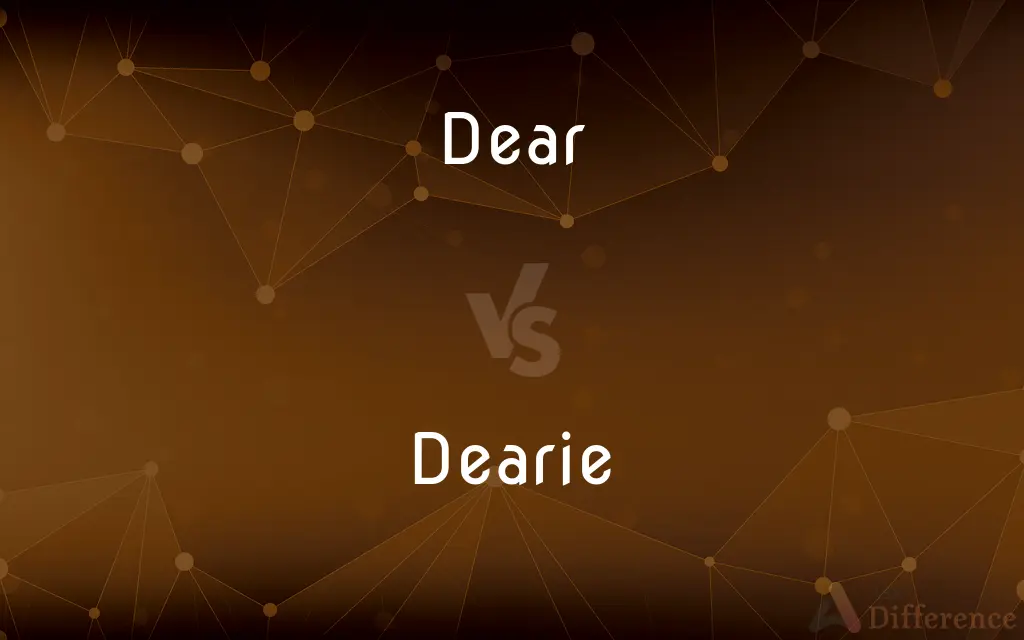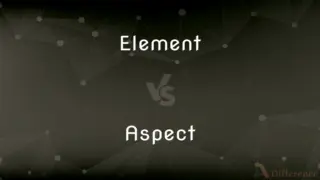Dear vs. Dearie — What's the Difference?
By Urooj Arif & Fiza Rafique — Updated on March 28, 2024
"Dear" is a term of endearment or a polite way to address someone, focusing on affection or respect, while "dearie" is a more informal, affectionate diminutive, often conveying a sense of familiarity or endearment.

Difference Between Dear and Dearie
Table of Contents
ADVERTISEMENT
Key Differences
"Dear" is widely used as a term of endearment or a polite form of address, signaling closeness, affection, or high regard. It can precede a name in a salutation, as in letters or emails, or stand alone as a way to refer to someone affectionately. On the other hand, "dearie" is a diminutive form of "dear," used to express affection in a more informal and sometimes patronizing manner. It often carries a sense of warmth and familiarity, used among close friends, relatives, or toward children.
While "dear" has a broad usage, applicable in both formal and informal contexts, "dearie" tends to be more colloquial and is less commonly used in formal settings. The use of "dearie" can imply a greater level of intimacy or a casual, comforting tone that "dear" might not convey as strongly.
In terms of linguistic context, "dear" can also function as an adjective to describe something cherished or valued highly, such as in "my dear friend" or "dear memories." Conversely, "dearie" is almost exclusively used as a noun or vocative expression, not as an adjective to describe objects or concepts.
The choice between "dear" and "dearie" can reflect the speaker's relationship with the addressee, the desired tone, and the context of the conversation. While "dear" can denote respect and affection in a wide array of situations, "dearie" tends to be reserved for moments requiring a touch of emotional warmth or playful intimacy.
Both "dear" and "dearie" have evolved over time, with "dear" maintaining its place as a staple of affectionate address in English. "Dearie," while less universally employed, preserves a quaint charm that endears it to those who use it as a token of affection, nostalgia, or familial warmth.
ADVERTISEMENT
Comparison Chart
Usage
Broad (formal and informal)
Informal
Tone
Affectionate, respectful
Familiar, sometimes patronizing
Context
Salutations, affectionate address
Close relationships, endearment
Form
Noun, adjective
Noun
Implication
Affection, respect, value
Intimacy, warmth, comfort
Compare with Definitions
Dear
Can describe close relationships.
My dear friend called yesterday.
Dearie
Dearie:
Dear
A term of endearment or respect.
You are very dear to me.
Dearie
Less formal, more intimate than dear.
I've missed you, dearie.
Dear
Signifies value or importance.
This is a dear possession of mine.
Dearie
An affectionate diminutive form.
How are you, dearie?
Dear
Used in formal salutations.
Dear Mr. Smith.
Dearie
Rarely used in written communication.
See you soon, dearie!
Dear
Flexible in use, both as noun and adjective.
That was a dear moment.
Dearie
Conveys familiarity and warmth.
Don't worry, dearie, it'll be alright.
Dear
Regarded with deep affection
He is very dear to me
A dear friend
Dearie
Often used toward children or close ones.
Come here, dearie, and see this.
Dear
Expensive
Five pounds—that's a bit dear!
Dearie
"Dearie" is a popular song. The music was written by David Mann, and the lyrics, by Bob Hilliard.
Dear
Used as an affectionate or friendly form of address
Don't you worry, dear
Dearie
A person who is dear; sweetie.
Dear
At a high cost
They buy property cheaply and sell dear
Dearie
Same as Deary.
Dear
Used in expressions of surprise, dismay, or sympathy
Oh dear, I've upset you
Dearie
A special loved one
Dear
Loved and cherished
My dearest friend.
Dear
Greatly valued; precious
Lost everything dear to them.
Dear
Highly esteemed or regarded. Used in direct address, especially in salutations
Dear Lee Dawson.
Dear
High-priced; expensive.
Dear
Charging high prices.
Dear
Earnest; ardent
"This good man was a dear lover and constant practicer of angling" (Izaak Walton).
Dear
(Obsolete) Noble; worthy.
Dear
Heartfelt
It is my dearest wish.
Dear
Severe; grievous; sore
Our dearest need.
Dear
A person who is greatly loved. Often used as a form of address.
Dear
An endearing, lovable, or kind person
What a dear she is!.
Dear
With fondness; affectionately.
Dear
At a high cost
Sold their wares dear.
Dear
Used as a polite exclamation, chiefly of surprise or distress
Oh dear.
Dear me.
Dear
(UK) High in price; expensive.
The dearer the jewel, the greater the love expressed.
Dear
Loved; lovable.
Dear
Lovely; kind.
Dear
Loving, affectionate, heartfelt
Such dear embrace tenderly comforts even in this dear sorrow.
Dear
Precious to or greatly valued by someone.
The dearer the giver, the dearer the trinket he brings!
Dear
A formal way to start (possibly after my) addressing somebody at the beginning of a letter, memo etc.
Dear Sir/Madam/Miss, please notice our offices will be closed during the following bank holidays:nb....
Dear
A formal way to start (often after my) addressing somebody one likes or regards kindly.
My dear friend, I feel better as soon as you come sit beside my sickbed!
Dear
An ironic way to start (often after my) addressing an inferior.
My dear boy, if your grades don't pick up I won't bounce you on, but over my knee!
Dear
(obsolete) Noble.
Dear
Severe, or severely affected; sore.
Dear
(obsolete) Fierce.
The Christens found the heathens dear, as the lion doth the bear.
Dear
A very kind, loving person.
My little cousin is such a dear, always drawing me pictures.
Dear
A beloved person.
Dear
An affectionate, familiar term of address, such as used between husband and wife.
Pass me the salt, would you dear?
Dear
An elderly person, especially a woman.
Dear
(obsolete) To endear.
Dear
Dearly; at a high price.
Dear
(dated) Indicating surprise, pity, or disapproval.
Dear, dear! Whatever were they thinking?
Dear
Bearing a high price; high-priced; costly; expensive.
The cheapest of us is ten groats too dear.
Dear
Marked by scarcity or dearth, and exorbitance of price; as, a dear year.
Dear
Highly valued; greatly beloved; cherished; precious.
Neither count I my life dear unto myself.
And the last joy was dearer than the rest.
Dear as remember'd kisses after death.
Dear
Hence, close to the heart; heartfelt; present in mind; engaging the attention.
[I'll] leave you to attend him: some dear causeWill in concealment wrap me up awhile.
His dearest wish was to escape from the bustle and glitter of Whitehall.
Dear
Of disagreeable things and antipathies.
In our dear peril.
Would I had met my dearest foe in heavenOr ever I had seen that day.
Dear
A dear one; lover; sweetheart.
That kiss I carried from thee, dear.
Dear
Dearly; at a high price.
If thou attempt it, it will cost thee dear.
Dear
To endear.
Dear
A beloved person; used as terms of endearment
Dear
A sweet innocent mild-mannered person (especially a child)
Dear
Dearly loved
Dear
With or in a close or intimate relationship;
A good friend
My sisters and brothers are near and dear
Dear
Earnest;
One's dearest wish
Devout wishes for their success
Heartfelt condolences
Dear
Having a high price;
Costly jewelry
High-priced merchandise
Much too dear for my pocketbook
A pricey restaurant
Dear
With affection;
She loved him dearly
He treats her affectionately
Dear
At a great cost;
He paid dearly for the food
This cost him dear
Common Curiosities
Is "dear" appropriate for formal letters?
Yes, "dear" is appropriate and commonly used in formal letters and salutations.
Is "dear" used worldwide in English-speaking countries?
Yes, "dear" is widely used and recognized in English-speaking countries.
Is "dearie" more common in certain regions?
"Dearie" might be more common or carry different nuances in different English-speaking regions.
Do "dear" and "dearie" have the same level of affection?
Both express affection, but "dearie" may imply a closer, more intimate relationship.
Can "dearie" be considered condescending?
Depending on the context and tone, "dearie" can be perceived as condescending or overly familiar.
Would "dear" or "dearie" be more appropriate for a grandparent to use?
Either could be used, but "dearie" might convey a more intimate, familial affection.
Is it common to use "dear" in the beginning of emails?
Yes, starting emails with "Dear [Name]," is a standard, polite format.
How has the use of "dear" evolved over time?
"Dear" has maintained its role as a term of endearment and respectful address, with stable usage over time.
Can "dear" be used to address strangers?
While it can be used politely, context is key to avoid seeming overly familiar.
Is "dear" still common in modern communication?
Yes, "dear" remains common and acceptable in both formal and informal modern communication.
Can "dearie" be used in professional contexts?
"Dearie" is generally too informal and affectionate for professional contexts.
What impact does tone have on using "dearie"?
Tone greatly affects how "dearie" is received, with the potential to sound endearing or patronizing.
Are there any synonyms for "dearie"?
Synonyms for "dearie" include "sweetheart," "darling," and "honey," among others.
How do the connotations of "dear" and "dearie" differ?
"Dear" conveys respect and affection broadly, while "dearie" suggests closer intimacy or casual affection.
Are there cultural considerations in using "dear" or "dearie"?
Cultural familiarity and norms can influence how these terms are perceived and used in different contexts.
Share Your Discovery

Previous Comparison
Element vs. Aspect
Next Comparison
Captain vs. PilotAuthor Spotlight
Written by
Urooj ArifUrooj is a skilled content writer at Ask Difference, known for her exceptional ability to simplify complex topics into engaging and informative content. With a passion for research and a flair for clear, concise writing, she consistently delivers articles that resonate with our diverse audience.
Co-written by
Fiza RafiqueFiza Rafique is a skilled content writer at AskDifference.com, where she meticulously refines and enhances written pieces. Drawing from her vast editorial expertise, Fiza ensures clarity, accuracy, and precision in every article. Passionate about language, she continually seeks to elevate the quality of content for readers worldwide.















































